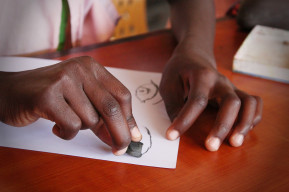Article
Social Media Use and Psychosocial Well-Being of Youth in Haiti during Covid-19
«[…] I found some funny videos that had helped me to support stress and I found time to share verified information in order to help people to protect themselves better», says a participant during the individual interview conducted by a group of young Haitian researchers. Selected by UNESCO for their program "Youth As Researchers", more than three hundred young people explored the multiple impacts of the Covid-19 pandemic while proposing solutions and recommendations.
The official announcement of the first cases of Covid-19 in Haiti on March 2020 was received with fear and uncertainty. Most experts anticipated this unprecedented sanitary disaster will severely affect Haiti because of its weak health system and the incapacity of the Haitian government to work for public welfare. Thankfully, a major catastrophe has been avoided, however, it may be too early to be relieved. This pandemic has impacted not only the economic sphere, but it particularly impacted psychosocially. Haitian society was still recovering from the economic and psychosocial consequences of the political lockdown “Peyi Lòk” started in 2018. When Covid-19 hit, people were forced to stay home as required by the government to avoid the propagation of the virus. Thus, social media became the prevalent spaces for young people to continue to figure out their future and their projects. Consequently, we decided as young Haitian researchers to find the link between the use of social media and the psychosocial well-being of young Haitians during the Covid-19.
Thus, under the supervision of UNESCO, the research conducted by a group was interested in the role of the use of social media in the reduction or intensification of psychosocial consequences occurred during the pandemic on young people in Haiti. Seven people elaborated the research protocol: Peterson Anténor (the team leader), Ernst Dimitry Cadet, Marline Bilgaï Grand Jean, Nem Jean-Baptiste, Nephtalie Pierre, Nishina Prévilon and Ludwika Télusmon. They are young undergraduate and graduate students in the law, psychology, anthropology, education, and philosophy field.
This article aims to expose the main conclusions and recommendations of this study while demonstrating the importance of this initiative in young people life.
The official announcement of the first cases of Covid-19 in Haiti on March 2020 was received with fear and uncertainty. Most experts anticipated this unprecedented sanitary disaster will severely affect Haiti because of its weak health system and the incapacity of the Haitian government to work for public welfare. Thankfully, a major catastrophe has been avoided, however, it may be too early to be relieved. This pandemic has impacted not only the economic sphere, but it particularly impacted psychosocially. Haitian society was still recovering from the economic and psychosocial consequences of the political lockdown “Peyi Lòk” started in 2018. When Covid-19 hit, people were forced to stay home as required by the government to avoid the propagation of the virus. Thus, social media became the prevalent spaces for young people to continue to figure out their future and their projects. Consequently, we decided as young Haitian researchers to find the link between the use of social media and the psychosocial well-being of young Haitians during the Covid-19.
Thus, under the supervision of UNESCO, the research conducted by a group was interested in the role of the use of social media in the reduction or intensification of psychosocial consequences occurred during the pandemic on young people in Haiti. Seven people elaborated the research protocol: Peterson Anténor (the team leader), Ernst Dimitry Cadet, Marline Bilgaï Grand Jean, Nem Jean-Baptiste, Nephtalie Pierre, Nishina Prévilon and Ludwika Télusmon. They are young undergraduate and graduate students in the law, psychology, anthropology, education, and philosophy field.
This article aims to expose the main conclusions and recommendations of this study while demonstrating the importance of this initiative in young people life.

1 September 2021
Last update:
21 April 2022
We already had less hope because of the socio-economic situation that worsens. With this difficult pandemic, it was more difficult, says one of the participants
Hence, a more important use of social platforms to face the psychosocial effects of the pandemic.
Even if our study involves a small sample due to some constraints, this has initiated an area of research underexploited. Moreover, the YAR program highlights the importance of participation of young people in meaningful projects creating knowledge for the greater good. The end of the program of Youth As Researchers will be in October 2022, and the main results of our work were firstly presented in Haiti, publicly during a virtual event on the UN International Youth Day on August 13th, 2021.






